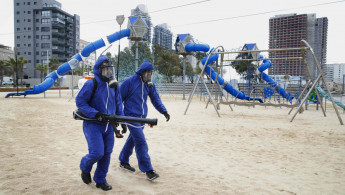Israel's Mossad buys 100,000 'unusable' testing kits with wrong swabs for coronavirus
"Unfortunately, what we just received is not exactly what we needed," the ministry's deputy director-general said in comments quoted by Haaretz.
Mossad responded by saying "we will ascertain the needs through the health ministry".
The tests are missing a vital patented liquid in which the testing swabs are put before they are screened for COVID-19, spokesperson Magon David Adom told The Jerusalem Post.
Without the patented liquid, the tests can not be administered.
Adom said Prime Minister Benjamin Netanyahu is "using his connections around the world now" to try to obtain the needed liquid by the end of the week.
Mossad's mission to obtain more coronavirus tests was reported earlier this week by Israeli media. Ynet reported that the intelligence agency had managed to procure the tests from two countries.
The Jerusalem Post reported that Mossad had obtained the tests with consent.
 |
|
| [Click to enlarge] |
Israel's health ministry is looking to increase the daily number of tests administered across Israel.
Israel has 529 confirmed cases of COVID-19, Haaretz reported, with another 44 in the occupied Palestinian territories and tens of thousands in self-isolation. Roughly a quarter of the new cases were detected in the last 24 hours.
Controversial emergency measures
With the Israeli government enacting a series of emergency measures to stem the spread of the new coronavirus, Prime Minister Netanyahu is facing growing accusations that he is exploiting the crisis to entrench himself in power and undermining the country's democratic foundations.
|
Amid a wave of sweeping restrictions that have put Israel in near shutdown mode, Netanyahu has managed to postpone his own pending criminal trial, authorise unprecedented electronic surveillance of Israeli citizens and block parliament from pressing ahead with legislation aimed at pushing him from office.
The moves, on the heels of the country's third inconclusive election in less than a year and under the shadow of Netanyahu's corruption indictment, sparked leading opposition figure Yair Lapid to tell Israeli citizens that they "no longer live in a democracy."
Amid growing anger toward Netanyahu, police on Thursday blocked two convoys of cars from reaching the Knesset, or parliament, where activists planned to protest against the government moves.
Most controversially, the Israeli government instructed the shadowy Shin Bet internal security service to start deploying the agency's phone surveillance technology to help curb the spread of the new coronavirus in Israel by tracking the moves of the infected.
"It has been decided that from today, foreign nationals who are not citizens of Israel and who do not hold Israeli citizenship or residency will not be allowed entry into Israel," a foreign ministry statement said.
Read more: Coronavirus shows how Israel is in charge of life and death in Gaza
The measure came into effect "immediately," it added.
It has banned non-essential movement and ordered the closure of all leisure and entertainment venues.
Earlier on Wednesday, Israel closed off Palestinian-administered areas of the occupied West Bank, a decision made in coordination with the Palestinian government, based in Ramallah.
The border crossing with the Gaza Strip, controlled by the Islamist group Hamas, is also closed.
Agencies contributed to this report.Follow us on Facebook, Twitter and Instagram to stay connected





 Follow the Middle East's top stories in English at The New Arab on Google News
Follow the Middle East's top stories in English at The New Arab on Google News
![Israeli forces ordered bombed Gaza's Jabalia, ordering residents to leave [Getty]](/sites/default/files/styles/image_330x185/public/2176418030.jpeg?h=a5f2f23a&itok=_YGZaP1z)

